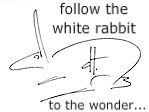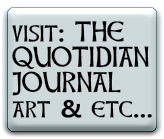 5 stars
5 starsHere is the spring 2009 edition and once again I found myself not disappointed with this quarterly journal. To see the whole table of contents & contributors -
click hereHere are a few favorite lines...
"The absence of the tragic sense of life is killing us...To refuse tragedy is to refuse history, for history is the story of conflicts and injustices that cannot be merely undone...The notion that Christianity is somehow alien to tragedy - that it is simply and straightforwardly "comic" because the resurrection makes for a happy ending - could not be more radically wrong...Unless we can believe that God has willingly submitted himself to the harsh necessities of the created order, then we will be helpless when those necessities lay us low." ~ Gregory Wolfe (pgs 4, 6)
"I've learned that nothing makes a bit of sense to me unless I write about it...I can't explain it but to say that writing
is my thinking, or my feeling now, and given how my life is turning out, I'm going to need to write a while before I understand." ~ Wilmer Mills (pg 17)
"As Karl Barth loved to say, God's "no" also contains his ever greater "yes."" ~ Artur Rosman (pg 33)
"Why build in the shadow of a hill / when you can build
on it?"
"But now, there is only now / and this walking." ~ Alice Friman (pgs 42, 43)
"The people we call artists have always gone into a dark space. A space turned inside-out. Not a somber space, where darkness is sadness, but a mysterious one - like the nighttime darkness of the imaginative child who marches golden caravans across his bedroom ceiling. The poet Homer, archetype of artists, was famously blind - yet out from his darkness pulsed eternal heroes, gigantic and grand like constellations." ~ Katie Kresser (pg 45)
~ Madeline Defrees (a former nun reflecting on her vocation as a poet):
"There was a lot of internal pressure away from poetry. I knew Hopkins had given it up because he thought it would interfere with prayer. And Thomas Merton had published an essay in Commonweal saying that if a person was looking for a life of contemplation, sooner or later the time would come when that person would have to give up poetry, because contemplation was moving towards silence, and poetry was necessarily moving toward expression. But then, five or ten years later, it bothered Merton's conscience, so he wrote an essay saying he had made a mistake, that in fact poetry was not something someone did, but part of what someone was. I used to think that because poetry required a kind of total attention, and so did prayer, that they went together. I had superiors, at least one, who told me that I wasn't anything special just because I was a poet. I knew I wasn't supposed to be writing poems when I was supposed to be praying. But they really are very close." (pgs 63-64)
"I think memorizing poetry is a great discipline...First of all, I think it gets at things that more direct language can't. It expands. It's like something you put in water and then it just expands. We hear so much language that's 95 percent waste - and so something that is more memorable is significant." (pg 69)
"There could hardly be anything more shocking than the doctrine of the incarnation. It's as if Christianity built in this irreverence: the divine, the holy, the inexhaustible had nostrils, an anal cavity." ~ Debbie Blue (pg 85)


































